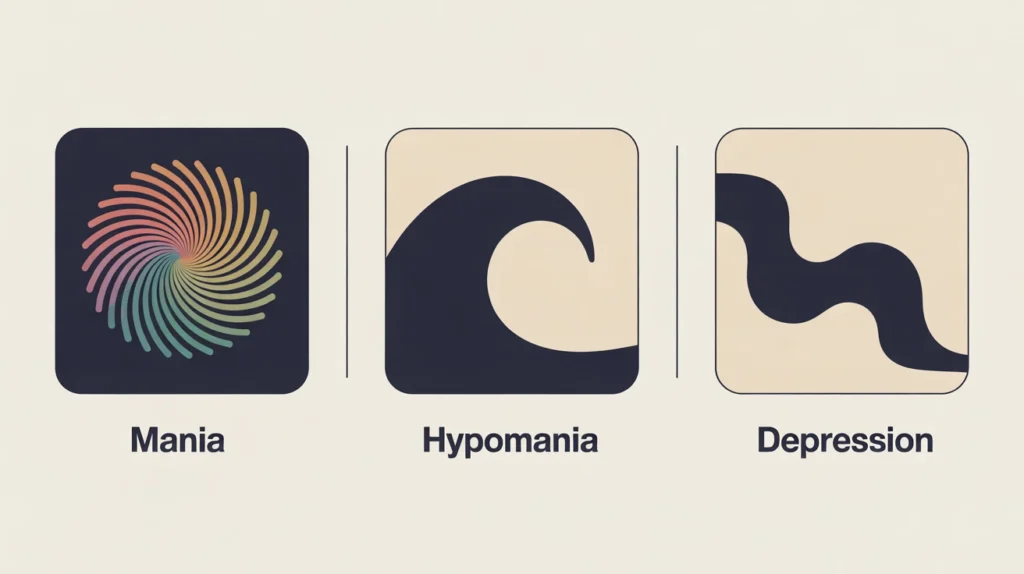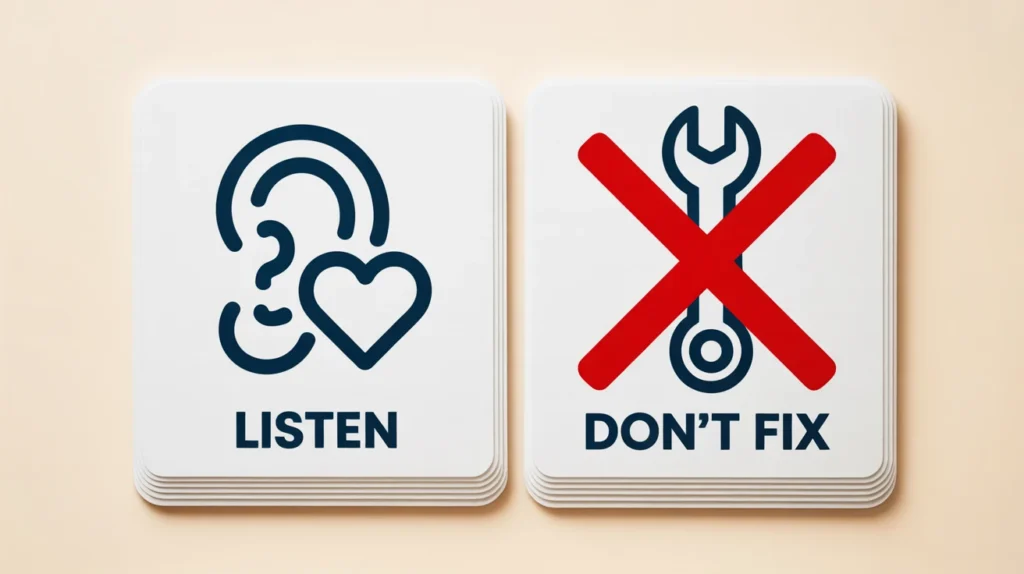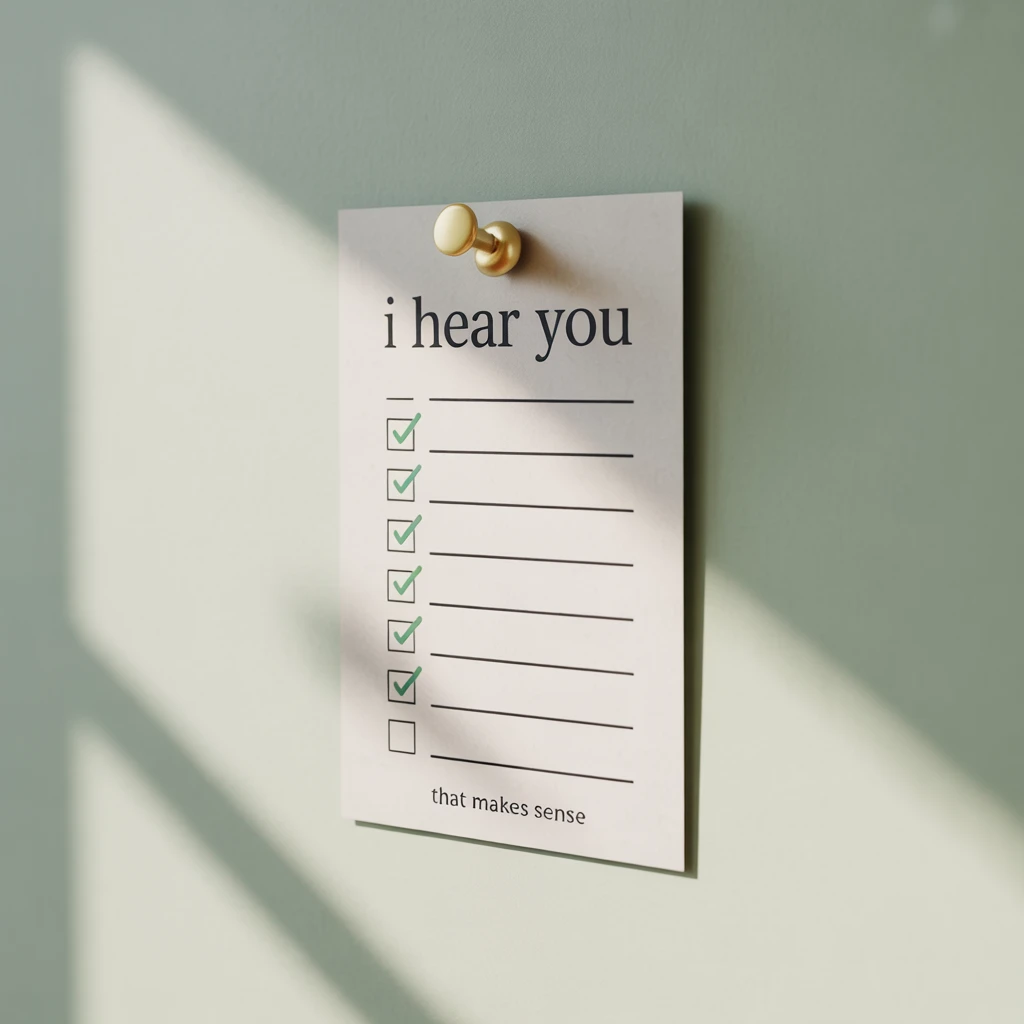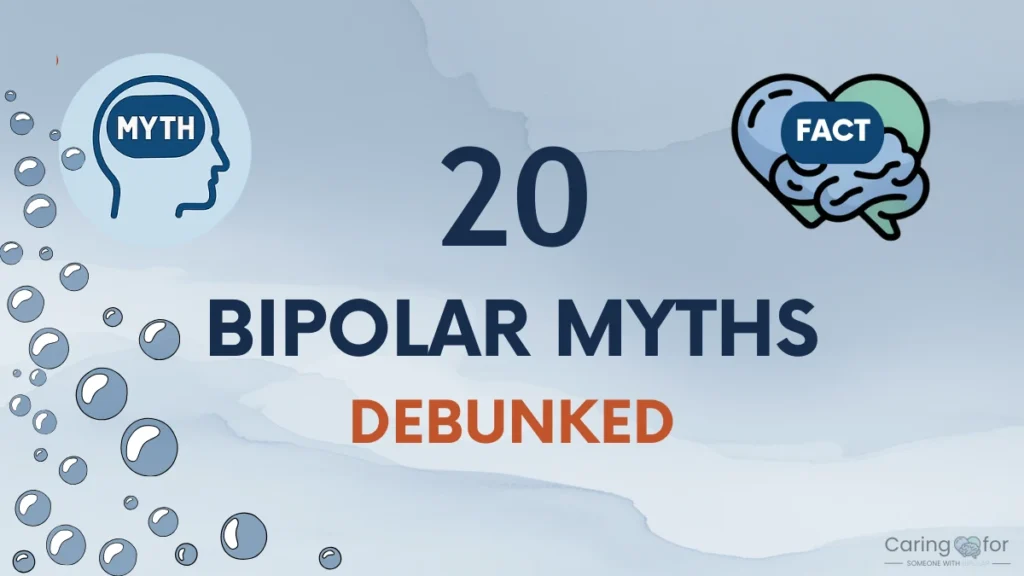When it comes to what not to say to someone with bipolar disorder, there’s a strange irony: people who care the most sometimes say the most damaging things, without realizing it.
If you’ve ever spoken to someone with bipolar disorder, you may have hesitated before answering, unsure whether your words would land as support or judgment. And let’s be honest, most of us haven’t been taught how to talk about bipolar disorder, let alone how to speak to someone navigating it.
If you’ve ever spoken to someone with bipolar disorder, chances are you’ve hesitated before saying something, unsure whether your words would land as support or judgment. Need a printable to guide you? Check out the Bipolar Emergency Plan (free template).
This article exists to close that gap.
We’ll walk through 15 phrases to avoid, some that seem harmless, others clearly stigmatizing, and, more importantly, what to say instead. You’ll get supportive alternatives: language that validates rather than dismisses and helps rather than hurts.
Because here’s the truth: words don’t just fill silence. They either build connection or deepen isolation. And when someone you care about is living with bipolar disorder, those tiny choices in language can mean everything.
Whether you’re a friend, partner, sibling, or simply trying to be better, this guide will help you avoid common pitfalls and communicate with more empathy, clarity, and confidence.
Let’s get into it.
Understanding Bipolar Disorder: More Than Just Mood Swings
Before we can talk about what not to say to someone with bipolar disorder, we have to understand what they’re actually living through. And it’s not just “ups and downs”, it’s a complex, medically recognized mood disorder that alters energy levels, decision-making, and emotional regulation in deeply unpredictable ways.

What Is Bipolar Disorder, Really?
At its core, bipolar disorder is a brain-based mental health condition involving extreme shifts in mood, energy, and activity levels. These shifts aren’t just about feeling “happy” or “sad”, they’re categorized into distinct mood episodes, each with its own set of challenges:
- Mania: Elevated mood, impulsivity, racing thoughts, grandiosity, it can feel euphoric but also dangerously destabilizing.
- Hypomania: A milder version of mania, often mistaken for high productivity or “just being in a good mood,” but it can still lead to risky behavior.
- Depression: Deep lows marked by hopelessness, fatigue, lack of interest, and, for some, suicidal ideation.
There are two primary types:
- Bipolar I Disorder: At least one full manic episode, often accompanied by major depressive episodes.
- Bipolar II Disorder: Pattern of hypomanic and depressive episodes, without full-blown mania.
These aren’t mood swings you can just “snap out of.” They’re chemically driven, medically documented conditions that often require a combination of medication, therapy, and support.

Why Language Hurts (Even If You Don’t Mean It To)
Now, imagine dealing with this reality, and hearing someone say, “Are you sure you’re not just being dramatic?”
The sting isn’t just emotional. It’s invalidating. It implies that your suffering isn’t real. That your condition is just a quirk, or worse, an excuse.
That’s why understanding bipolar disorder matters. Because when we minimize it with language, even unintentionally, we’re not just hurting someone’s feelings. We’re chipping away at their dignity, their legitimacy, their sense of being seen.
Is Bipolar Disorder the Same as Being “Moody”?
No. Bipolar disorder involves clinically defined episodes that last days, weeks, or longer, with patterns over time. It’s not the same as a bad mood or being “emotional.” While everyone has mood shifts, bipolar shifts are extreme, persistent, and can disrupt work, relationships, and daily function.
1. “Can’t You Just Be Happy?”
Why It’s Hurtful
This question might sound innocent, even encouraging, but to someone with bipolar disorder, it lands like a punch. It reduces a complex neurological condition to a matter of attitude, as if all they need is a better outlook or a walk in the sun.
The truth? During a depressive episode, joy can feel inaccessible, not because someone isn’t trying hard enough, but because their brain is chemically out of sync. Suggesting that happiness is just a choice can feel incredibly invalidating, dismissing both the reality of their condition and the effort they may already be making to stay afloat.
As one person put it: “If I could choose to be happy, don’t you think I would have done that by now?”
A Better Alternative
Try this instead:
“I know things feel really heavy right now. Is there anything I can do to help lighten it, even just a little?”
Why this works: It validates the current experience without forcing positivity. It shows you’re present, not dismissive. Even more, it invites support without pressure, a lifeline, not a demand.

2. “Are You Off Your Meds Again?”
Why It’s Hurtful
Few phrases shut down a conversation faster than this one. It’s not just accusatory — it’s loaded with judgment. Even if the question stems from concern, it often implies instability, unreliability, or even danger. Worse, it can feel like the person’s entire identity is being boiled down to whether or not they’ve taken a pill.
Medication is a deeply personal, and sometimes fraught, part of managing bipolar disorder. Side effects, dosage changes, stigma, and access issues are all part of the equation. Assuming someone’s behavior must be due to non-compliance oversimplifies their experience and places the blame squarely on them.
This phrase doesn’t open dialogue. It creates defensiveness, shame, and distrust.
A Better Alternative
Say this instead:
“Hey, I’ve noticed you seem a little off lately, want to talk about how you’re feeling?”
Why it works: This approach focuses on observation, not accusation. It creates space for a real conversation about how they’re doing, whether or not medication is part of the picture. It also shows care without control, something everyone deserves, especially in vulnerable moments.
3. “You’re Just Being Dramatic”
Why It’s Hurtful
This phrase cuts deep because it minimizes real, often overwhelming emotional distress. When someone with bipolar disorder is in the middle of a manic or depressive episode, their emotions may be intense, but they’re not theatrical performances. They’re symptoms. Biological, psychological, and often painful.
Calling someone “dramatic” suggests they’re seeking attention or exaggerating. It shifts the focus away from empathy and into judgment. For many people with bipolar, that kind of labeling reinforces the stigma they already face — the one that tells them their feelings aren’t valid unless they’re calm, quiet, and easy to manage.
It’s not just invalidating. It’s dehumanizing.
A Better Alternative
Try this:
“It looks like you’re going through something intense, I’m here if you want to talk or just need space.”
Why this helps: It acknowledges the emotional intensity without discrediting it. It also offers presence and respect, two things people with bipolar disorder are often denied when their symptoms become visible. It says, “I see you,” instead of “I need you to tone it down.”
4. “You Don’t Seem Bipolar”
Why It’s Hurtful
At first glance, this might sound like a compliment. But under the surface, it’s riddled with assumptions, about what bipolar disorder “should” look like, how it’s supposed to manifest, and who gets to define it.
Here’s the reality: bipolar disorder isn’t always visible. It doesn’t come with a warning label or a predictable emotional script. Some people are high-functioning. Some aren’t. Others are stable for years. Some struggle more openly. But telling someone they “don’t seem bipolar” implies that they’re either faking it, overreacting, or worse, that they must be hiding something.
This phrase quietly reinforces the idea that mental illness only “counts” if it fits a stereotype. That’s not just inaccurate, it’s damaging.
A Better Alternative
Say something like:
“Thank you for sharing that with me. I really respect how openly you’re navigating this.”
Why it matters: This response centers validation and trust. It acknowledges the courage it takes to talk about a stigmatized condition and avoids tone-policing or disbelief. Instead of questioning their identity, it supports their truth.
5. “Everyone Gets Sad Sometimes”
Why It’s Hurtful
This one might be the most deceptively dismissive phrase on the list. It tries to normalize pain, but instead it flattens a serious mental health condition into something ordinary, like the blues, or a bad day. And while sadness is part of life for everyone, bipolar depression is not sadness. It’s an all-consuming, often immobilizing state that can last for weeks or longer.
When someone says, ‘everyone gets sad,’ it can feel like a minimization of what may be a life-threatening medical episode. The phrasing quietly suggests the person is being dramatic or should ‘just deal with it’ like everyone else. Instead of fostering connection, that message builds walls of misunderstanding.
A Better Alternative
Say this instead:
“I can’t fully imagine what this feels like for you, but I’m here to listen, and I want to understand.”
Why this works: It embraces empathy without false equivalence. You’re not pretending to “get it,” and you’re not reducing their experience to your own. You’re creating emotional safety, something that’s often in short supply during depressive episodes.

6. “You’re So Moody”
Why It’s Hurtful
This phrase might come out casually, even playfully, but for someone with bipolar disorder, it lands like a judgment. It reduces complex, often painful mood fluctuations to a personality flaw. And here’s the kicker: it labels the person rather than recognizing the symptoms.
Being called “moody” carries baggage. It suggests unpredictability, instability, or even immaturity, as if emotional regulation is a choice they’re failing to make. But mood shifts in bipolar disorder aren’t about being irritable one moment and cheerful the next. They’re chemical. Neurological. Often outside conscious control.
Calling someone “moody” doesn’t just miss the mark, it can make them feel misunderstood, blamed, and isolated.
Mood shifts in bipolar disorder aren’t about choice. If you want to be more supportive, read our guide on support during depression.
A Better Alternative
Try this:
“You seem to be feeling a lot right now, is there anything I can do to support you?”
Why it’s better: Instead of slapping a label, this response recognizes that emotional turbulence is happening, without moral judgment. It centers curiosity and care, not critique. It also subtly reinforces that they’re more than their symptoms, they’re a whole person, deserving of empathy.
7. “Have You Tried Yoga or Dieting Instead of Meds?”
Why It’s Hurtful
This one might be rooted in good intentions, wanting to help, to offer a “natural solution.” But when you suggest someone replace their prescribed treatment with stretching or a smoothie, you’re implying that their condition is a lifestyle issue, not a medical one. That’s not just wrong,it’s dangerous.
Bipolar disorder is a biochemical, psychiatric illness. While self-care practices like exercise and nutrition can be incredibly supportive, they are not substitutes for medication or clinical care. For many, meds are life-saving. Suggesting they can simply swap them out for a yoga mat isn’t holistic, it’s dismissive.
And it puts the responsibility on the individual, as if their suffering persists because they haven’t tried hard enough to “heal naturally.”
A Better Alternative
Try saying:
“What’s been helpful for you in managing things lately?”
Why it works: It invites conversation instead of correction. It centers the person’s own experience, rather than pushing unsolicited advice. It also respects that managing bipolar is complex, often trial-and-error, and always deeply personal.
8. “You Don’t Need Therapy, You Just Need to Stay Busy”
Why It’s Hurtful
This kind of statement might seem like practical advice, keep yourself distracted, stay productive, power through. But for someone with bipolar disorder, it dismisses the actual need for clinical mental health care and implies that their struggle is just a result of idleness.
The idea that therapy is optional or unnecessary perpetuates a harmful myth: that mental illness can be solved with hustle. That if you’re struggling, you’re not trying hard enough. It shifts the blame back onto the person, and worse, it discourages seeking real help.
Telling someone to “just stay busy” when they’re in a depressive episode isn’t helpful. It’s like telling someone with a broken leg to try running it off.
A Better Alternative
Say something like:
“I’m really glad you’re open to support, therapy can be such a powerful part of healing. Let me know if you ever want help finding someone.”
Why it matters: This response normalizes therapy instead of sidelining it. It reinforces the idea that seeking help is strength, not weakness. And it quietly positions you as a supporter, not a fixer, not a critic.
9. “I Wish I Was Manic Sometimes, I’d Get So Much Done”
Why It’s Hurtful
At first glance, this might seem like an attempt at humor or even envy. But for people living with bipolar disorder, it’s anything but flattering. It romanticizes mania, a state that, while it may include bursts of energy or creativity, is also laced with impulsivity, racing thoughts, delusions, insomnia, and sometimes severe consequences like financial ruin or hospitalization.
Wishing for mania trivializes the damage it can cause. Instead, focus on safe, informed care, see our guide to support during mania (safety first). It ignores the crash that often follows, the regret, the broken relationships, and the exhaustion. It treats a dangerous symptom as a productivity hack.
Even if it’s said jokingly, this comment can leave someone feeling trivialized, unseen, and profoundly misunderstood.
A Better Alternative
Try this instead:
“I’ve read that mania can be overwhelming in ways people don’t always realize, if you ever want to talk about what it’s like for you, I’m here.”
Why this works: It demonstrates awareness, not assumption. It opens space for honesty instead of minimizing the experience. And most importantly, it breaks the toxic cycle of “glamorizing suffering” that so many people with bipolar disorder are forced to navigate.
10. “You’re Overreacting, Calm Down”
Why It’s Hurtful
There’s almost no phrase more guaranteed to escalate distress than “calm down.” It’s dismissive. It invalidates the person’s emotional reality in the moment, suggesting their reaction is irrational, exaggerated, or inconvenient.
For someone with bipolar disorder, especially during a manic or hypomanic episode, or a moment of anxiety or rage, being told they’re overreacting can feel like a denial of their humanity. It sends the message: “Your feelings are too much. You are too much.”
And let’s be real: has telling anyone to “calm down” ever actually worked?
More often, it shuts down communication, triggers defensiveness, and erodes trust.
A Better Alternative
Say this instead:
“This seems like a really intense moment, I want to understand what’s happening for you right now.”
Why this works: It meets the person where they are, not where you want them to be. It removes blame and replaces it with curiosity and care. And it signals that you’re willing to stay in the discomfort with them, a powerful act of support.
11. “You’re Acting Crazy”
Why It’s Hurtful
Few words carry as much historical baggage and cruelty in mental health contexts as “crazy.” It’s not just a flippant insult, it’s a loaded term that has been used to shame, marginalize, and dehumanize people with mental illness for generations.
Saying someone is “acting crazy” doesn’t just describe behavior, it pathologizes the person. It reinforces the idea that they’re unpredictable, dangerous, or not to be trusted. And for someone living with bipolar disorder, who may already wrestle with internalized stigma, hearing this from someone they care about can deepen feelings of shame, isolation, or self-loathing.
Even if said in the heat of the moment, it can leave a scar.
A Better Alternative
Say this instead:
“It seems like something really intense is going on, I care about you, and I want to understand.”
Why this matters: It keeps the focus on support, not judgment. It replaces a damaging label with compassion and presence. And it helps deconstruct the harmful narrative that emotional expression, especially when it stems from illness , is something to ridicule or fear.
12. “You Were Fine Yesterday”
Why It’s Hurtful
This phrase might come from confusion or even concern, but its effect is deeply invalidating. It suggests that emotional or behavioral shifts need to follow a predictable timeline to be real or legitimate. For people with bipolar disorder, that’s just not how it works.
Mood episodes can shift suddenly, even without a clear trigger. Someone might appear high-functioning one day and feel utterly incapable the next. Suggesting that yesterday’s stability should override today’s struggle ignores the fluctuating nature of the disorder, and worse, implies they’re being inconsistent or unreliable.
It turns genuine suffering into something suspicious.
A Better Alternative
Say this:
“It seems like today’s really tough, I’m here for you however you need, even if things felt different before.”
Why it’s better: It acknowledges that people are allowed to change, especially when dealing with a condition as dynamic as bipolar disorder. It affirms their current state without doubting their past. And most importantly, it provides reliable support in an unpredictable experience.
13. “You’re Just Using Your Diagnosis as an Excuse”
Why It’s Hurtful
This phrase doesn’t just sting, it undermines the entire process of healing. It implies manipulation, dishonesty, or laziness, as if the person is choosing to lean on their diagnosis to avoid responsibility.
The reality? Most people with bipolar disorder already struggle with guilt and self-doubt. They’re often hyperaware of how their actions affect others and may feel the need to constantly prove they’re “trying hard enough.” Accusing someone of weaponizing their diagnosis not only adds shame, it silences open communication.
It tells them: You’re not allowed to name what you’re going through. Not if it affects me.
A Better Alternative
Say this:
“I know this must be difficult to talk about. I really appreciate you being honest with me about how you’re doing.”
Why it helps: This approach opens space for accountability without stripping away empathy or nuance. It encourages conversation, not defensiveness. It recognizes the effort it takes to be transparent about mental health, and that’s exactly what leads to trust.
14. “You Always Make Everything About You”
Why It’s Hurtful
This phrase is often born out of exhaustion, but for someone with bipolar disorder, it hits like a spotlight of blame. It paints them as self-centered or emotionally manipulative, rather than someone managing a disorder that often takes over their internal world.
When a person is in a manic or depressive state, their ability to modulate conversations, reactions, or attention can be disrupted. It’s not ego, it’s neurology. And calling them “selfish” for something rooted in mental illness doesn’t just hurt, it reinforces the belief that they’re a burden.
It replaces curiosity with criticism. And it shuts down meaningful connection in moments where they may need it most.
A Better Alternative
Say this:
“I can tell you’re overwhelmed, I’m here, and I want us to figure this out together when you’re ready.”
Why it works: It defuses tension without assigning blame. It offers partnership, not punishment. And it communicates patience, something that’s often more healing than any lecture or logic.

15. “You’ll Never Get Better”
Why It’s Hurtful
This is one of the most devastating things someone can hear, because it erases hope. Whether said in frustration, resignation, or anger, it delivers a crushing message: You are broken beyond repair.
For people with bipolar disorder, progress can be nonlinear. There may be relapses, setbacks, and long stretches of survival mode. But that doesn’t mean they’re not trying. And it certainly doesn’t mean they’re doomed.
Telling someone they’ll “never get better” robs them of the very thing that often keeps them going, the belief that with support, treatment, and time, things can improve.
Worse, it may push someone deeper into despair, isolation, or even suicidal thinking.
A Better Alternative
Say this instead:
“No matter how tough this gets, I still believe in your ability to find balance and healing , even on the hard days.”
Why it matters: This offers compassion without pretending to have all the answers. It affirms belief in the person’s journey, without needing instant results. And for someone who may feel they’re sinking, those words can be the emotional lifeline they didn’t know they needed.
How to Support Someone with Bipolar: Beyond Words
It’s one thing to avoid the wrong words. It’s another, deeper, thing to show up with lasting, grounded support. Because while language matters, support doesn’t end with the right sentence. It’s in how you respond when the mood shifts. When plans fall through. When things get messy.
Here’s how to support someone with bipolar disorder in ways that go beyond what you say.
1. Listen Without Trying to “Fix”
Bipolar disorder doesn’t need quick solutions or motivational speeches. What people often need most is someone who’s willing to sit in the discomfort with them, to witness, not correct.

Try:
- “That sounds really overwhelming. I’m here to sit with you in it.”
- “You don’t have to explain it all right now, I’ll still be here later.”
2. Validate Their Feelings Without Minimizing
Even if you don’t understand what they’re going through, you can affirm that what they’re feeling is real and worthy of care.

Avoid saying: “At least…” or “It could be worse.”
Instead, say: “That makes total sense given what you’re facing.”
3. Respect Their Boundaries (Even If They’re Hard to Understand)
Sometimes your loved one may go quiet. Cancel plans. Ask for space. Don’t take it personally. Honor their limits without disappearing.
- Ask: “Would you like space or company right now?”
- Respect a no, and gently check back in later.
4. Know the Difference Between Support and Rescue
You can offer help, but you can’t heal them. That’s not your job. And trying to become their therapist, their emotional anchor, and their crisis line all in one? That leads to burnout.

Instead:
- Be supportive, not controlling.
- Encourage professional help, but don’t force it.
5. Celebrate Stability as Much as Crisis Recovery
Don’t just show up when things are falling apart. Show up when they’re okay too. Send a check-in text on a random Tuesday. Celebrate the “boring” days, they matter.
What If I Don’t Always Know What to Say or Do?
That’s okay. You’re not expected to get it perfect. The most important thing is presence with humility. You can always say:
“I don’t totally understand, but I’m here and I care.”
Sometimes, that’s more powerful than anything else.
Dealing with Bipolar Anger and Mood Swings
Supporting someone with bipolar disorder often means learning to navigate the emotional turbulence that comes with mood episodes. That includes bipolar anger, rapid mood shifts, and moments where their reactions might feel sudden or outsized.
These aren’t just personality quirks, they’re symptoms. And they deserve compassion, not confrontation.
Understanding the Roots of Bipolar Anger
Bipolar anger isn’t just about being “in a bad mood.” It can be sharp, unpredictable, and sometimes explosive, especially during manic or mixed episodes, when irritability and overstimulation are high. In depressive phases, that anger can turn inward, becoming self-directed shame or even suicidal ideation.
These mood-driven reactions aren’t always about you. And they’re rarely within full conscious control.
What You Can Do in the Moment
When someone’s angry or volatile:
- Stay calm, not reactive. Your composure can defuse escalation.
- Avoid matching energy. Don’t argue back or try to “win” the moment.
- Pause if needed. Say, “I want to talk when we’re both feeling a little more grounded.”
- Use reflective statements. Try: “It sounds like this is really overwhelming right now.”
Most importantly: don’t take it personally. That’s easier said than done, but crucial. You’re witnessing a symptom, not an attack on your character.
When Mood Swings Happen
- Don’t act shocked or roll your eyes. That communicates judgment.
- Gently ask, “Is this one of those days where things feel like they’re shifting fast?”
- Keep routines consistent where possible, predictability can soothe chaos.
What If I Accidentally Escalate Things?
You’re human. It happens. The key is to come back later and say something like:
“I realized I wasn’t as calm as I could’ve been earlier. I want to get better at being there for you in those tough moments.”
That kind of repair builds more trust than perfection ever could.
Frequently Asked Questions
Crisis Support & Resources
When someone is living with bipolar disorder, whether they’re in a stable place or spiraling, it’s essential to remember this: help is always available. And you don’t have to navigate it alone.
Below are trusted, immediate-access resources for when things feel overwhelming:
In a Crisis? Reach Out Now:
📞 Call or text 988 – Suicide & Crisis Lifeline
Available 24/7 in the United States. Trained counselors are ready to help, for you or someone you love.
Additional Resources:
- National Alliance on Mental Illness (NAMI): nami.org
Education, support groups, helplines, and advocacy tools. - Mental Health America: mhanational.org
Free screening tools, community support, and mental health education. - The Trevor Project (LGBTQ+ Support): thetrevorproject.org
24/7 crisis services for LGBTQ+ youth and young adults.
For Loved Ones:
If you’re supporting someone in distress:
- Don’t try to manage it all alone.
- Reach out to hotlines, local therapists, or emergency care if needed.
- Keep your own emotional support system strong, too.
Expert Insights & Real Voices
One of the most powerful ways to break stigma is through stories, and through the voices of those who’ve lived what others only theorize.
While this article doesn’t replace medical advice, it’s grounded in the combined wisdom of mental health professionals and those who walk through life with bipolar disorder daily.
Clinical Perspective
“When supporting someone with bipolar disorder, your words matter more than you think. Language shapes how safe people feel, and safety is foundational for stability.”
— Dr. Lena Rhodes, licensed clinical psychologist
Therapists and psychiatrists often emphasize the importance of emotional validation, consistent routines, and non-reactive communication. These are core components not just of recovery, but of maintaining trust in close relationships.
From the Inside: Lived Experience Quotes
“When I’m in a depressive episode, I don’t need advice. I need space to not be okay without someone trying to fix me.”
— Anonymous, Bipolar II
“The worst thing someone ever said to me was, ‘You seemed fine this morning.’ It made me feel like I had to prove I was unwell to be taken seriously.”
— James, 31
“The first time someone said, ‘I believe you,’ I cried. That was the moment I stopped hiding.”
— R., Bipolar I
These voices don’t speak for every experience, but they reveal a truth that algorithms and textbooks often miss: empathy is medicine.
Further Reading & Internal Resources
To keep learning and supporting with intention, here are some next reads:
- Understanding Bipolar Episodes: How mania, hypomania, and depression unfold
- Supporting a Partner with Bipolar Disorder: What emotional support really looks like
- Treatment Options for Bipolar Disorder: From medication to therapy and lifestyle supports
- Setting Boundaries Without Guilt: A guide for loved ones navigating emotional burnout
These resources deepen your understanding, because showing up with care isn’t a one-time thing. It’s a process.
Last Updated
Last Updated: July 2025
We regularly review and refresh our mental health content to ensure accuracy, relevance, and alignment with the latest psychological research and lived experience voices.
Conclusion: Say Less to Fix, and More to Connect
If you’ve made it this far, you’re already doing the most important thing: trying to understand. And that effort, messy, imperfect, sometimes awkward, matters more than saying the perfect words.
Supporting someone with bipolar disorder isn’t about walking on eggshells. It’s about walking beside them, especially when the path is uneven. It’s asking better questions. Catching yourself mid-sentence. Learning, apologizing, adjusting. And above all, staying.
Because in the end, what helps isn’t having all the right phrases memorized. It’s being someone who sees the human behind the symptoms and says, with presence, not performance, “I’m not going anywhere.”





